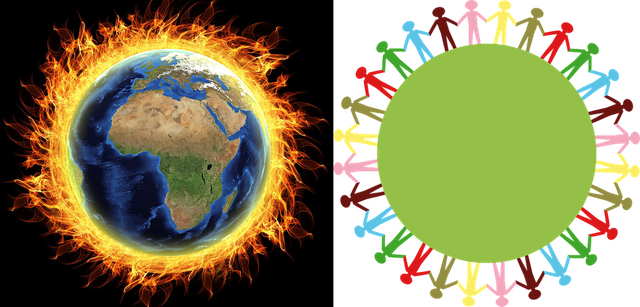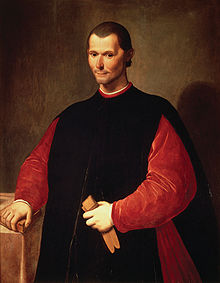The World How You Want It To Be vs The World How It Is (featuring Niccolò Machiavelli)

In philosophy and politics it is always important to differentiate: Am I exploring the mechanisms that have lead society and humankind become the way it is or am I talking about the changes I want to see in society and humankind?
The mix-up or neglection of one or the other can often lead to unsolvable disputes. On the one hand people often do not want to accept certain "ugly" truths, just because their ideology teaches them to not believe in it - a Logic of Ideals has nowadays often taken the place of religion. The over-moralized outrage in the media is a testimony to people who are judging persons from a standpoint that they would not take in their private life (aka reality).
On the other hand many people love to criticize the current state of things without offering a valuable alternative. A lot of my frustration with the libertarian movement is that the simple solution of "getting rid of the state" will not solve that much in my opinion. It should be quite obvious that it is not the people in Washington or the Bundestag who actually hold the power. Those institutions are just tools for our shadow government (Banks and Big Corp). To just kill a perceived evil doer (the state) will only leave a vacuum of power that might be filled with even worse, an historic example of that would be the beheading of Louis XIV in the french revolution.
The subject of how power works in human society is quite fascinating to me. Machiavelli's "The Prince" is one of the few books I voluntarily read, it is often misunderstood and the content often shamed for being very immoral. The book is essentially a guide on how to come to and hold power in the monarchical system. A lot of these rules still apply today and while I would also love to change them at some point, ignoring them or childishly disobeying them will often lead to failure, at least if you seek to change the world.
The two rules of Machiavelli I remember are: If you want to kill someone you should kill his whole family and legacy, otherwise you will be the victim of vengeance at some point. The other thing are his propose of having multiple faces or masks depending on your audience. A lion for your enemy - strong and fearsome, A fox for your friends - smart and nimble, I dont remember the animal of the face you should have towards your people but it was linked to innocence and morality.

https://en.wikipedia.org/wiki/Niccol%C3%B2_Machiavelli#The_Prince
You can generally see successful people obeying to the observations made by Machiavelli, therefore it is at least worth to read it if you are interested in how the world is truly run. Being so bold in his analysis about state power at a time where many mainstream philosophers held the state as a holy system given by God, he is more revolutionary than many people give him credit for.
While I really don't want to implement everything Machiavelli said, especially the loved vs feared part, I think it is at least important to show an enemy that you are dangerous. It helped to not get bullied in school and actually be much less violent. If you are prepared to use (psychological or physical) violence in a controlled measure you are much less likely to be forced to use it. People with a violent mindset often only respect violence, so if you show them you are not hesitant in using violence you will be able to deescalate a lot of conflicts.
I do think healthy opinions should always be a critical analysis of reality, but if you are going to judge it you should always be aware that you need to propose an alternative. Always being friendly and never hateful is one of those ridiculous proposals, that tries to deny the fact that humans will always have a certain degree of hatred in their heart, suppressing this hate is rather unhealthy and leads to a lot of the overmoralized outburst we see. Because it is OK to hate someone if the general public (mainstream media) decided it is OK to hate on someone, amirite?!
It's rare nowadays to see politicians who are genuinely ideological and aspire to implement a better vision of society.
Instead, politicians are all Machiavelli-types, using their office simply to better themselves and grab onto as much power as possible for no specific purpose other than to enrich themselves and have their names and faces documented on the record.
Machiavelli himself said that the government is the most dangerous part of society. I don't think he really wanted to inspire a bunch of phony hypocrites who only embrace personal gain. Many of those would love to think they are on par with the historic persons who embraced Machiavelli but I am quite sure that these spineless shitters are exactly the kind of people Machiavelli would despise.
"The wish to acquire more is admittedly a very natural and common thing; and when men succeed in this they are always praised rather than condemned. But when they lack the ability to do so and yet want to acquire more at all costs, they deserve condemnation for their mistakes."
All in all Machiavelli was too much on the blunt pragmatism side of things, but he had a very good grasp of how society and politics function. His lack of moral is more due him trying to explore the nature of politics and leadership as truthfully as possible.
I have read this article with great interest. I like your opinion. But I think: There must and may be people who notice a mistake or who simply realize that something is wrong without a solution. I also like to give the example of the leaning tower of Pisa. Anybody can see it's not right, but not everyone can fix it.
I should have mentioned that I also see value in both criticizing without solution and constructing an ideal world without looking too much in how realistically it can be achieved. A lot of times I also admire the problem without having a solution ;). However the "it is a bad system, but the best we know" argument will always prevail without offering an alternative.